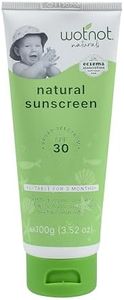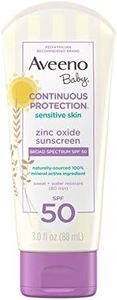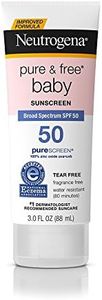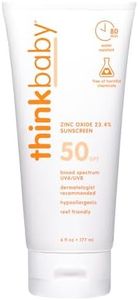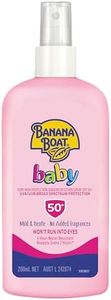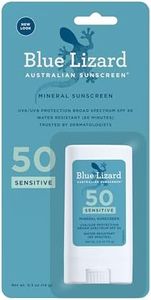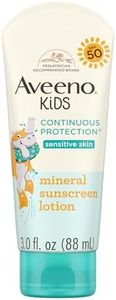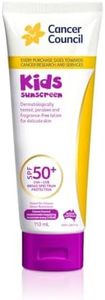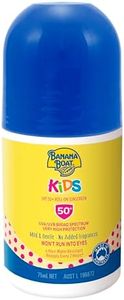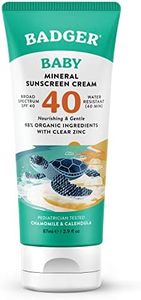We Use CookiesWe use cookies to enhance the security, performance,
functionality and for analytical and promotional activities. By continuing to browse this site you
are agreeing to our privacy policy
10 Best Sunscreen For Babies
From leading brands and best sellers available on the web.By clicking on a link to a third party's website, log data is shared with that third party.
Buying Guide for the Best Sunscreen For Babies
Choosing sunscreen for babies is a thoughtful process, as their skin is much more sensitive than that of adults. When picking a sunscreen for a baby, it's important to look for gentle, protective formulas made specifically for young skin. Focus on products that offer strong sun protection without causing irritation or allergic reactions. Always test a small amount of any product you choose on your baby's skin to check for adverse reactions before full use.SPF RatingSPF stands for Sun Protection Factor and measures how well a sunscreen protects skin from UVB rays, the type that causes sunburn. Higher SPF numbers mean greater protection. For babies, an SPF of at least 30 is generally recommended, as it blocks about 97% of UVB rays. SPF 50 blocks slightly more, but the increase in protection isn’t dramatic. You should select a high SPF sunscreen for babies, but remember that no sunscreen blocks 100% of rays, so physical protection like clothing and shade is still important.
Mineral vs. Chemical SunscreenThere are two main types of sunscreen: mineral (also called physical) and chemical. Mineral sunscreens use ingredients like zinc oxide and titanium dioxide, which sit on the skin and physically block UV rays. These are generally recommended for babies because they’re less likely to cause irritation or trigger allergies. Chemical sunscreens absorb into the skin and neutralize UV rays; however, they can sometimes cause sensitivity, so they are less preferred for babies. When picking sunscreen for a baby, a mineral-based formula is usually the safest choice.
Hypoallergenic and Fragrance-FreeHypoallergenic means the sunscreen is less likely to cause an allergic reaction, while fragrance-free means no added scents. Babies have delicate skin that’s more susceptible to irritation and rashes. Choosing a sunscreen that is both hypoallergenic and fragrance-free helps minimize the risk of skin irritation. Look for these labels, especially if your baby has shown sensitivities before.
Broad Spectrum ProtectionBroad spectrum means the sunscreen protects against both UVA and UVB rays. UVB rays cause sunburn, while UVA rays can penetrate deeper and contribute to long-term skin damage. For full coverage and best safety for your baby, it is important to choose a sunscreen labeled as broad spectrum so they are protected from both types of rays.
Water ResistanceWater resistance describes how long the sunscreen stays effective when your baby is wet from sweating or swimming. Water resistance is typically rated for either 40 or 80 minutes. If your baby will be in and out of water or sweating, pick a water-resistant sunscreen. If the baby will be mostly in the shade and dry, this may be less of a concern for you. Always remember to reapply sunscreen after swimming or if your baby is wiped with a towel.
Ease of ApplicationSome sunscreens are thick and difficult to spread, which can make application on wiggly babies challenging. Others come in sprays, sticks, or creams. For infants, creams or lotions are usually preferred because they allow thorough and visible application, ensuring no spots are missed. Spray sunscreens aren’t recommended for babies, as inhaling the product can be harmful. Consider what way of application will be easiest and safest for you and your baby.
